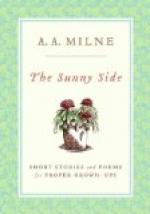But Lord Poldoodle is rising again. “Our next poet,” he says, “is Miss Miranda Herrick, whose work is so distinguished for its—er—its—er—distinction.”
Miss Herrick, dressed in pale green and wearing pincenez, flutters in girlishly. She gives a nervous little giggle, pushes out her foot, withdraws it and begins:
When I take my bath in the morning—
The audience wakes up with a start. “When
you take your what!” says
Lord Poldoodle.
Miss Herrick begins again, starting this time with the title.
LIFE
When I take my bath in the morning,
When I strip for the cool delight,
And the housemaid brings
Me towels and things,
Do I reck of the coming night?
A materially-minded man whispers to his neighbour that he always wonders what’s for breakfast. “H’sh!” she says, for there is another verse to come.
When my hair comes down in the evening,
And my tired clothes swoon to the ground,
Do I bother my head,
As I leap in bed,
Of the truth which the dawn brings round?
In the uncomfortable pause which follows, a voice is heard saying, “Does she?” and Lady Poldoodle asks kindly, “Is that all, dear?”
“What more could there be?” says Miss Herrick with a sigh. “What more is there to say? It is Life.”
“Life! How true!” says the hostess. “But won’t you give us something else? That one ended so very suddenly.”
After much inward (and outward) wrestling Miss Herrick announces:
A THOUGHT
The music falls across the vale
From nightingale to nightingale;
The owl within the ivied tree
Makes love to me, makes love to me;
But all the tadpoles in the pond
Are dumb—however fond.
“I begin to think that there is something in a tadpole after all,” murmurs Lord Poldoodle to himself, as the author wriggles her way out.
“After all,” says one guest to another, “why shouldn’t a tadpole make love as much as anybody else?”
“I think,” says her neighbour, “that the idea is of youth trying vainly to express itself—or am I thinking of caterpillars? Lord Poldoodle, what is a tadpole exactly?”
“A tadpole,” he answers decisively, “is an extremely immature wriggling creature, which is, quite rightly, dumb.”
Now steps forward Mr. Horatio Bullfinch, full of simple enthusiasm, one of the London school. He gives us his famous poem, “Berkeley Square.”
The men who come from the north country
Are tall and very fair,
The men who come from the south country
Have hardly any hair,
But the only men in the world for me
Are the men of Berkeley Square.
The sun may shine at Colchester,
The rain may rain at Penge;
From low-hung skies the dawn may rise
Broodingly on Stonehenge.
Knee-deep in clover the lambs at Dover
Nibble awhile and stare;
But there’s only one place in the world for
me,
Berkeley—Berkeley Square.




